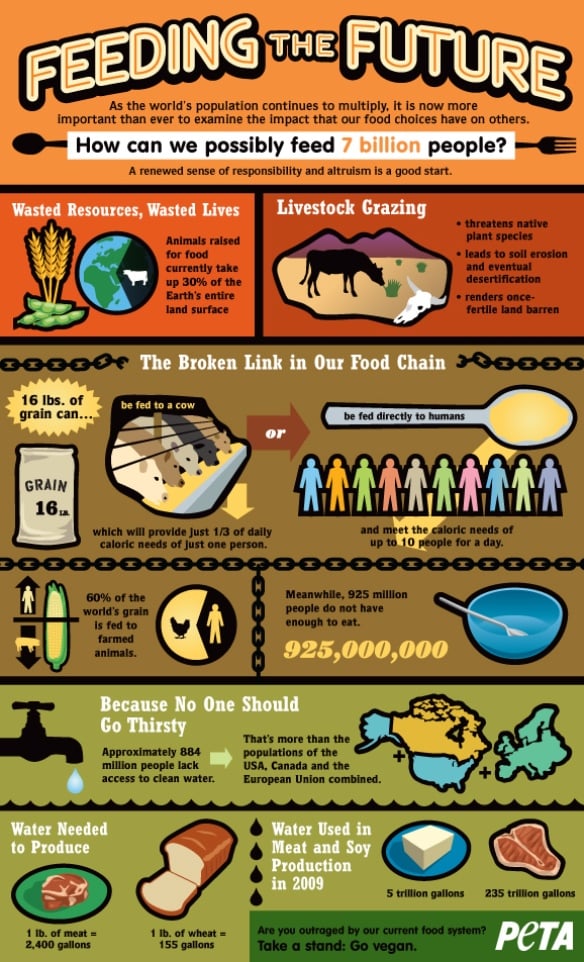How Does Animal Cruelty Affect The Environment
Raising animals for food requires massive amounts of land, food, energy, and water and causes immense animal suffering.
The Climate Crisis
By some estimates, fauna agronomics is responsible for more greenhouse gases than all of the world's transportation systems combined. Co-ordinate to the United Nations, a global shift toward a vegan nutrition is vital to gainsay the worst effects of the climate crisis.
H2o Apply
Information technology takes an enormous amount of water to grow crops for animals to eat, clean filthy mill farms, and give animals h2o to drink. A unmarried cow used for milk can potable up to 50 gallons of water per mean solar day—or twice that amount in hot weather—and it takes 683 gallons of water to produce simply 1 gallon of milk. It takes more than than 2,400 gallons of h2o to produce 1 pound of beef, while producing one pound of tofu only requires 244 gallons of h2o. Past going vegan, ane person can salvage approximately 219,000 gallons of water a yr.


Pollution
Animals raised for nutrient in the U.South. produce many times more excrement than does the unabridged human being population of the country. Co-ordinate to the U.S. Environmental Protection Bureau (EPA), animals on U.S. factory farms produce about 500 million tons of manure each twelvemonth. With no fauna sewage processing plants, it is most often stored in waste matter "lagoons" (which tin be seen in aerial views of factory farms) or it gets sprayed over fields.
Runoff from factory farms and livestock grazing is one of the leading causes of pollution in our rivers and lakes. The EPA notes that bacteria and viruses tin can be carried past the runoff and that groundwater can be contaminated.
Factory farms frequently dodge water pollution limits by spraying liquid manure into the air, creating mists that are carried away past the wind. People who alive nearby are forced to inhale the toxins and pathogens from the sprayed manure. A report by the California Land Senate noted, "Studies have shown that [animal waste] lagoons emit toxic airborne chemicals that can cause inflammatory, immune, irritation and neurochemical problems in humans."
State Use
Using land to grow crops for animals is vastly inefficient. It takes 75% less land to feed someone on a found-based (vegan) diet than it does to feed a meat-eater since the crops are consumed straight instead of being used to feed animals. Co-ordinate to the U.N. Convention to Combat Desertification, it takes up to x pounds of grain to produce just 1 pound of meat, and in the The states lonely, 56 million acres of land are used to grow feed for animals, while merely 4 million acres are producing plants for humans to eat.
More 90 percent of all Amazon rainforest state cleared since 1970 is used for grazing livestock. In add-on, ane of the primary crops grown in the rainforest is soybeans used for creature feed. (The soybeans used in virtually veggie burger, tofu, and soy milk products sold in the United States are grown right here in the U.South.)
Oceans
While mill farms are ruining our state, commercial line-fishing methods such as lesser trawling and long-lining often clear the ocean floor of all life and destroy coral reefs. They also kill thousands of dolphins, sea turtles, sharks, and other "bycatch" animals. Coastal fish farms release carrion, antibiotics, parasites, and non-native fish into sensitive marine ecosystems. In addition, since most farmed fish are cannibal, they are fed massive quantities of wild-caught fish. For example, it takes up to 3 pounds of fish meal to produce every pound of farmed salmon.
What You Can Do
Download the Pandemic-Free World pamphlet to acquire how existence vegan tin can create a pandemic-free globe for all.
The skillful news is that it's easier than always to switch to an Earth-friendly, vegan diet. Take PETA's pledge to go vegan. You volition likely come across an comeback in your health inside a calendar month, and your censor will be articulate, knowing that you're doing your part to assistance the environment and animals.
Source: https://www.peta.org/issues/animals-used-for-food/meat-environment/
Posted by: peckfornow.blogspot.com

0 Response to "How Does Animal Cruelty Affect The Environment"
Post a Comment